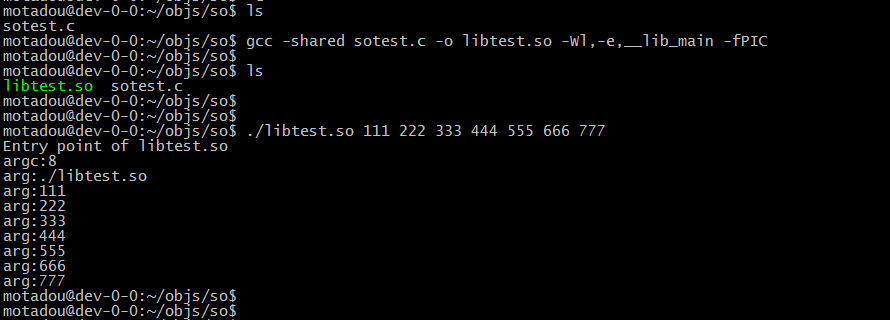实现可执行的so动态链接库
相比于静态链接库,Linux上的动态链接库和可执行程序是同一种格式,都是ELF格式。原理上动态库也能和可执行程序一样直接运行。
比如,可以直接运行“/lib64/ld-linux-x86-64.so.2”,还有“/lib/x86_64-linux-gnu/libpthread.so.0”, 还有“/lib/x86_64-linux-gnu/libc.so.6”等等。举个例子,libc.so.6是C/C++运行时库的GNU实现,我们直接运行该动态库,打印如下信息: 可见,动态库直接运行后,提示了该动态库的编译信息、版本信息等等。在实际项目中,我们也可以为动态库增加类似功能,用户直接运行我们提供的动态库之后,我们就打印该库的编译环境、运行方法、编译版本等等信息,或者完成其他功能。
可见,动态库直接运行后,提示了该动态库的编译信息、版本信息等等。在实际项目中,我们也可以为动态库增加类似功能,用户直接运行我们提供的动态库之后,我们就打印该库的编译环境、运行方法、编译版本等等信息,或者完成其他功能。
C语言的实现示例如下:

其中:
C++语言的实现示例如下:
示例如下:

2.http://rachid.koucha.free.fr/tech_corner/executable_lib.html
比如,可以直接运行“/lib64/ld-linux-x86-64.so.2”,还有“/lib/x86_64-linux-gnu/libpthread.so.0”, 还有“/lib/x86_64-linux-gnu/libc.so.6”等等。举个例子,libc.so.6是C/C++运行时库的GNU实现,我们直接运行该动态库,打印如下信息:
 可见,动态库直接运行后,提示了该动态库的编译信息、版本信息等等。在实际项目中,我们也可以为动态库增加类似功能,用户直接运行我们提供的动态库之后,我们就打印该库的编译环境、运行方法、编译版本等等信息,或者完成其他功能。
可见,动态库直接运行后,提示了该动态库的编译信息、版本信息等等。在实际项目中,我们也可以为动态库增加类似功能,用户直接运行我们提供的动态库之后,我们就打印该库的编译环境、运行方法、编译版本等等信息,或者完成其他功能。让动态库可以直接运行的方法和原理
要让一个动态链接库可以直接运行,那么需要在其编译期间指定一个入口函数。当我们直接运行该动态库时,系统直接调用该入口函数。C语言的实现示例如下:
// 保存:将本文件保存,比如名称叫做:sotest.c
// 编译:gcc -shared sotest.c -o libtest.so -Wl,-e,__lib_main -fPIC
// 运行:./libtest.so
#include <stdio.h>
#include <unistd.h> // needed for the _exit() function
// Must define the interpretor to be the dynamic linker
#ifdef __LP64__
const char service_interp[] __attribute__((section(".interp"))) = "/lib/x86_64-linux-gnu/ld-linux-x86-64.so.2";
#else
const char service_interp[] __attribute__((section(".interp"))) = "/lib/ld-linux.so.2";
#endif
void __lib_main(void)
{
printf("Entry point of libtest.so \n");
_exit(0);
}
编译运行:
其中:
- 1)service_interp指明了动态链接器ld的位置,系统不同,该位置可能不同;
- 2)入口函数__lib_main必须以_exit(0)或者exit(0)结束,否则可能会coredump;
- 3)-Wl表示传递给动态链接器ld的参数,后续的逗号会被替换为空格;
- 4)-e,__lib_main指定了入口函数,__lib_main名称仅示例,名称可自取;
C++语言的实现示例如下:
// 保存:将本文件保存,比如名称叫做:sotest.cpp
// 编译:g++ -shared sotest.cpp -o libtest.so -Wl,-e,__lib_main -fPIC
// 运行:./libtest.so
#include <stdio.h>
#include <unistd.h> // needed for the _exit() function
// Must define the interpretor to be the dynamic linker
#ifdef __LP64__
const char service_interp[] __attribute__((section(".interp"))) = "/lib/x86_64-linux-gnu/ld-linux-x86-64.so.2";
#else
const char service_interp[] __attribute__((section(".interp"))) = "/lib/ld-linux.so.2";
#endif
extern "C" {
void __lib_main(void)
{
printf("Entry point of libtest.so \n");
_exit(0);
}
}
入口函数的参数问题
动态链接库的入口函数不能像可执行程序int main(int argc, char ** argv)那样直接传入和获取参数。如果我们要向动态库的入口函数传递参数,动态库必须自己分析/proc/self/cmdline文件中的内容,自行分割参数。示例如下:
// 保存:将本文件保存,比如名称叫做:sotest.c
// 编译:gcc -shared sotest.c -o libtest.so -Wl,-e,__lib_main -fPIC
// 运行:./libtest.so 111 222 333 444 555 666 777
#include <stdio.h>
#include <stdlib.h>
#include <unistd.h>
#include <fcntl.h>
#include <string.h>
#include <sys/types.h>
#include <sys/stat.h>
struct CmdLine
{
int argc;
char ** argv;
};
void ReadCmdLine(struct CmdLine * pLine)
{
pLine->argc = 0;
pLine->argv = NULL;
/////////////////////////////////////////////////////////////////////////////////////
/// 读取文件
int32_t iFileId = open("/proc/self/cmdline", O_RDONLY, 0644);
if (iFileId < 0)
{
return ;
}
char szBuff[8192];
int iFileSize = read(iFileId, szBuff, sizeof(szBuff));
int iBegin = 0;
int iTemp = 0;
close(iFileId);
/////////////////////////////////////////////////////////////////////////////////////
/// 分析cmdLine
for (iTemp = 0; iTemp < iFileSize; iTemp++)
{
if (szBuff[iTemp] == '\0')
{
pLine->argc++;
}
}
pLine->argv = (char **)malloc(pLine->argc * sizeof(char *));
for (iTemp = 0, pLine->argc = 0; iTemp < iFileSize; iTemp++)
{
if (szBuff[iTemp] == '\0')
{
char * p = (char *)malloc(iTemp - iBegin + 1);
memcpy(p, szBuff + iBegin, iTemp - iBegin);
p[iTemp - iBegin] = '\0';
pLine->argv[pLine->argc++] = p;
iBegin = iTemp + 1;
}
}
}
// Must define the interpretor to be the dynamic linker
#ifdef __LP64__
const char service_interp[] __attribute__((section(".interp"))) = "/lib/x86_64-linux-gnu/ld-linux-x86-64.so.2";
#else
const char service_interp[] __attribute__((section(".interp"))) = "/lib/ld-linux.so.2";
#endif
void __lib_main(void)
{
printf("Entry point of libtest.so \n");
struct CmdLine cmdLine;
ReadCmdLine(&cmdLine);
printf("argc:%d\n", cmdLine.argc);
int iTemp = 0;
for ( ; iTemp < cmdLine.argc; iTemp++)
{
printf("arg:%s\n", cmdLine.argv[iTemp]);
}
_exit(0);
}
运行上述示例代码:
参考
1.《Advanced C and C++ Compiling》2.http://rachid.koucha.free.fr/tech_corner/executable_lib.html


